#juxtaposition of good and evil
Explore tagged Tumblr posts
Text
the magnus archives is the master and margarita but gayer and more aesthetic and the master and margarita is american politics but gayer and more aesthetic
#absolute chaos#juxtaposition of good and evil#religious elements#it's all there#the magnus archives#tma#this may only be funny to me#the master and margarita#mikhail bulgakov#jonathan sims#american politics#americana
29 notes
·
View notes
Text
Time for a Proper Pinned Post (PPP)!
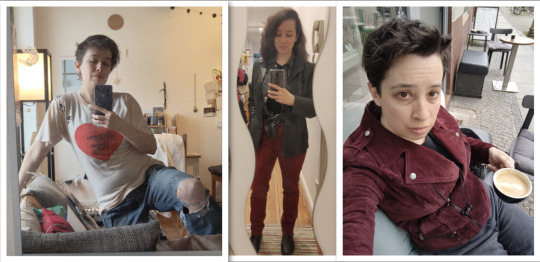
My name is Jinx. You can call me that or Cosmo. Any pronouns. I am not as old and crotchety as I act, but I'm still a full-grown adult.
I am first and foremost a songwriter, and you can listen to my songs right here on Tumblr or elsewhere on the internet.
If you like my music, want to support my top-surgery dreams, or are simply feeling generous, you can donate to my ko-fi.
Some other words that describe me: music nerd, language lover, accidental philosopher, avid autodidact, professional translator, writer for love, (former) editor for money, voracious reader, feminist, queer, kink-positive, neurodivergent. I’m pretty anachronistic.
Some of my favorite tags I often use on this blog can be found attached to this post. Enjoy!
EDIT: If Tumblr goes down, you'll be able to find me on Dreamwidth and probably also on Pillowfort. Feel free to add me there pre-emptively any time, just in case.
(also: I'm the leftist-socialist-anarchist type. Free Palestine, BLM, ACAB, FCK NZS, FCK AFD, you get the idea. Not a fan of TERFs or Zionists. I have no DNI.)
#pinned#songwriting#translation#musicblogging#what animals sound like#bread and roses#moments#my kind of humor#god is variation in sizes#happymaking#abandoned#always refrog#a#the city speaks#tof#round#good and evil do not exist#inexplicable#juxtapositions#philosophy of me#women looking#tumblr culture#reading challenge#laugh tag#bandom#how to be human#destruction#weather is my religion#food for thought#a day in the life
38 notes
·
View notes
Text
I, for one, thought Puff was just right for the tone
#wbn spoilers#wbn fireside#wbn interludes#worlds beyond number#puff the smog spirit#www interlude 2: the clearing#it’s about the juxtaposition and the nuanced nature of good and evil and all those smoggy shades of grey#and the truthful devastation of its curse#(im just saying all these fuckers play small and forgotten gods so well that if they do not play wanderhome one day i’ll be#even more devastated than this one shot)
38 notes
·
View notes
Text
"Here's a wholesome rewrite of how Total Drama SHOULD have ended" "Why don't we focus on the nice pairings and not the toxic ones?!" "Fresh TV creates too many toxic ships"
#total drama#full offense. This is the point of the show#td#OK AND BESIDES THERES PLENTY NICE RESOLUTIONS.#there needs to be evil so the good stands out more#i think tdi shows it best tbh. Like Heather vs Leshawna and Gwen#and Bridget being thrown in between them#that was a great juxtaposition
7 notes
·
View notes
Text
Good versus Evil is a commonplace literary theme beyond the world of SGE, and could be likened to mirror-image symmetry, which is often seen in Soman’s juxtaposed images throughout the series. Yet, I was thinking: is there a literary equivalent for rotational symmetry and what would it look like? I think it would have to involve greater than two elements in play, each a few degrees removed from each other instead of a pair of direct opposites, but I don't have an example of this in practice.
In addition, one of the most prominent instances of juxtaposition in the series to me, by the way, is how the brothers treat their respective Deans, and how Rhian’s reaction is far more passive as he just lets Mayberry go:

And across the bay, there’s this laughable bit:

(I'm sure Rafal is not the only soul who finds it funny. Something about the timing and this being the last line to a section and the well-deserved comeuppance of the moment just read as funny.)
#school for good and evil#rise of the school for good and evil#rafal#rafal mistral#rhian#rhian mistral#dean mayberry#professor mayberry#dean humburg#sge#sfgae#tsfgae#the school for good and evil#rotsge#rotsfgae#my post#my analysis#the balance#balance#symmetry#theme#thematic idea#imagery#juxtaposition
10 notes
·
View notes
Text
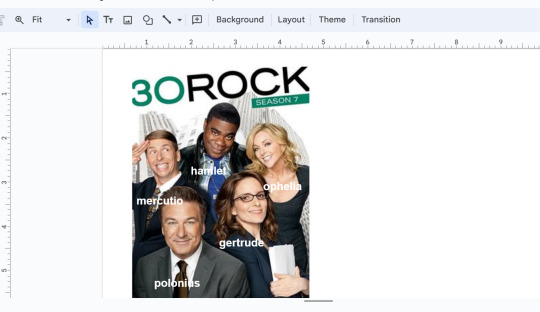
lit history class so bad it drives you to madness
edit oh my god i confused mercutio with horatio. i promise i know who both of those people are they just have similar names
#this isnt even good casting it was just my first instinct#ive posted about 30 rock 2x recently it might lead people to believe i endorse tina fey i do not#i would say i strongly dislike tina fey at best#actually i change my mind kenneth would be laertes#maybe it could be one of those limited cast thing where the same actors play multiple characters and theres like a thematic meaning#which is good bc i was also conflicted abt jack donaghy polonius or claudius#which tbh i think would be kind of cool double casting like the juxtaposition of their two characters. its probably been done before#like if the production could only afford to hire one old man. have him play the ghost too who cares#this is 30 rock characters btw not actors. to be clear. i am envisioning a riverdale musical episode#and if you were in this evil class. you would be too
3 notes
·
View notes
Text
pale blue eyes is about crowleys unrequited love and admiration of aziraphale. I’ll be your mirror is about crowleys need for aziraphale to show him that he accepts him and loves him and sees him for the kind being that he really is. In this essay I will
#good omens#‘you wouldn’t like it’ broski just doesn’t want his crush to find abt the playlist he made#he would like it:(#this is making me insane#the juxtaposition of aziraphale always reminding him he’s a demon so he must be evil#vs aziraphale telling him that deep down he’s actually good#he denies it bc of hell. really he wants aziraphale to see that not a part of him belongs to hell#he wants to be seen for the person he really is:( not as a fallen angel but someone kind and loving#he needs aziraphale to help him be kinder to himself smh
6 notes
·
View notes
Text
remmick and the vampires present a false dichotomy
Hogwood (the man who sold the twins the mill) and the KKK are very obviously bad, they are outright malicious bigotry, they use the n-word and plan to lynch the moore's and their community, they are so blatantly racist and hateful it's unavoidably obvious
remmick and the vampires however say that they believe in equality, say that they want to create a community, and yet remmick's goal throught the movie is to both metaphorically and literally steal sammie's ability for his own goal of reconnecting with his irish ancestors, a white man wants to harm a young and upcoming black man and use talents for his own goals without giving any regard to said black man's autonomy or agency
when sammie sings 'I lied to you' in the juke joint and calls forth the spirits from the past and future, it's a blend of cultures; west african, east asian, native american, and african american song and dance blend together across time and space to tell the stories of blues; where it takes its inspiration from, the music genres it then inspired, the complex history of black american culture and its intersections with other peoples of colour in the USA
when remmick and the vampires kill and turn the people in the juke joint, and then perform rocky road to dublin, only remmick's irish culture is on display, there is no influence from the black and asian people he has forcibly assimilated into his song, it's juxtaposition with the earlier scene is blatant, remmick is more than happy to assimilate people of colour into his 'community' of 'equals', and yet its only whiteness that is celebrated, that is normative
remmick claims that he's doing people a favour by turning them immortal, conviently ignoring that he literally has to suck the life out of them to do so, trapping their spirits on earth, he claims that he's the good guy, that the KKK were gonna come and lynch everyone at the joint in the morning anyways, conviently ignoring that he's doing the exact same thing; a white man leading a mob to kill a bunch of black people
in the final confrontation with sammie remmick repeatedly dunks him into the river, a forceful baptism. both the celtic irish and enslaved west africans had their religions suppressed and destroyed by colonialsm, had christianity forced upon them by the british empire, and in that scene we see remmick repeating that cycle, using christianity to inflict harm, and sammie reclaiming christianity, despite all the complex emotions he has arround it, as many colonised peoples have and still do, when he recites the lord's prayer
remmick and the vampires are no less racist than hogwood and the KKK, are no less predatory or evil, they're just less blantant about their bigotry, they represent the system, the normalised white supremacy that is seeped into the very foundation of culture in america, the point isnt that remmick would call any of the black characters in the movie the n-word, i dont think he would, the point is that his exploitation and desacration and inserting-himself-into-when-he-wasn't-invited of the juke joint is a microcosm of what white people have done to black american arts and culture since ever since there have been black and white people in america, and even before that
theres a reason vultures are shown early on in this movie
24K notes
·
View notes
Text

I go back to this shot so many times because I think it captures so many themes central to this show and central to Halbrand and Galadriel's relationship. It is at once intimate but also cosmically symbolic, like so many of Tolkien's themes are. It's why it recurs so often (as I have touched upon in previous metas). They are sleeping. It's a simple but powerful image. The words Galadriel says from the beginning -- Evil does not sleep. It waits— have added meaning. Here, we see "Halbrand" sleeping. We later find out that Halbrand is actually Sauron. Does that mean he was pretending here? It's a mystery but I think there are enough visual clues to support that this was real. This was Sauron’s reset to factory settings. As I have said before, his meeting on the sea with Galadriel was baptismal. He was reborn. Which echoes the foundational Tolkien belief that "nothing is evil in the beginning." Meaning that the races of Middle Earth and humanity in ours have the potential for good. And everything that happens, with the person and identity that Sauron tries to manifest as “Halbrand” from this point forward is not a lie. But an extension of this. He's sleeping. “Halbrand” is a dream. A dream that ended when evil awoke.
And as an aside it’s worth noting these lines between Arwen and Aragorn in FOTR:
Arwen: Do you remember when we first met?
Aragorn: I thought I had wandered into a dream.
Arwen: Long years have passed. You did not have the cares you carry now. Do you remember what I told you?
Aragorn: You said you’d bind yourself to me. Forsaking the immortal life of your people.
That's why the raft scene is so important. And it’s call forward to Aragorn and Arwen. Also you never see Sauron asleep again. It could be just a throwaway coincidence if not for the fact that we actually do see Sauron awake when others are sleeping, either seething in his nefarious plots or rage-brooding throughout the night.
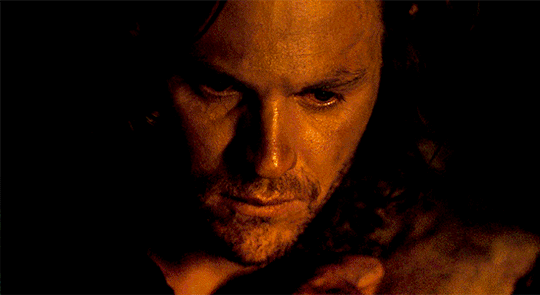
Even though dreams are no more real than illusions, they reveal truths, not lies. Because it is the realm of the subconscious. Our true selves as we are or who we wish to be. Our unexpressed desires or the fulfillment of unrequited hopes. In this moment, emphasized by two separate visuals, both Halbrand and Galadriel are sleeping. They are not just bound by fate and the vow they enacted in the midst of the storm. They are bound in this dream.
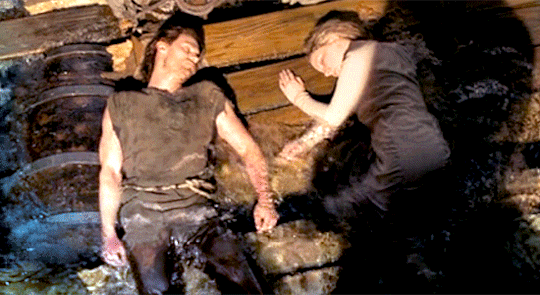
This idea is revisited again and again in season 2. Often I'm struck by the look on Elrond's face during this exchange. It's not the look of distrust or disappointment.
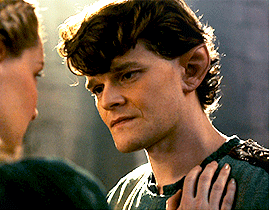
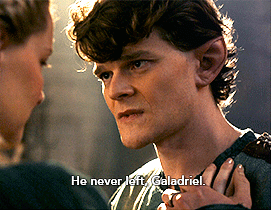
In this brief instant, Elrond is moved with sorrow for his dearest friend, for her broken heart. He cares deeply for Galadriel. You can see that he feels the depth of her pain and mourning for the love that she lost. In a way, it is a prescient moment because his own future will be marred by such bitter loss and tragic love that may or may not be the fruit of this doomed pairing. Still, Elrond's words are not judgement. Just truth. Elven memories do not dim. And so Galadriel will always be haunted by it. Which is why Elrond tells her, sadly: "He never left." In that memory of a dream, Halbrand survives. His mark is there. And when Galadriel reaches for Elrond to ground herself, he only provides a comforting pat and firmly releases her hand. I think part of it is a juxtaposition to Sauron. Where in the past, she instinctually reached for Halbrand and he grasped her in return, never intending to let go. She is brought back to the moment where they were at their closest point, where everything seemed to align perfectly. A memory perhaps tinged with the temptation and regret over having not reached for Halbrand as she may have desperately desired. And you see Elrond witness it right in front of him! When Galadriel’s mind wanders into a daydream, you can see Elrond's grief. And also, I think the other part of it is the symbolic gesture underscoring that Elrond cannot pull her from this dream. He cannot liberate her. No one else can. Because he, Halbrand, never left. So Galadriel must summon strength and clarity to let him go. To walk away.
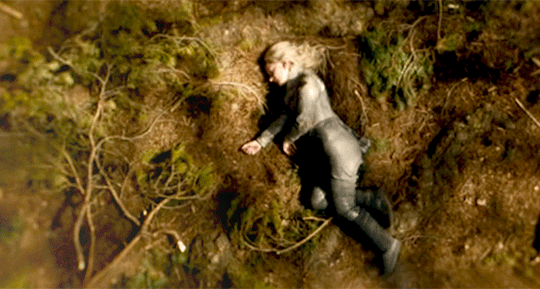
Because I think Sauron left a part of himself in this dream. If we revisit this shot where Galadriel has fallen. Seemingly "asleep" -- you see the impression of a figure next to her. As I said before, I think this is meant to suggest that not only was someone there, but that someone is still there. In the dream world or even the unseen one. In that place where elven memory does not fade with the good borne of their shared dream: hope, loyalty, bravery and love. In contrast, you see Sauron watching. Because evil is awake. And Sauron is waiting.
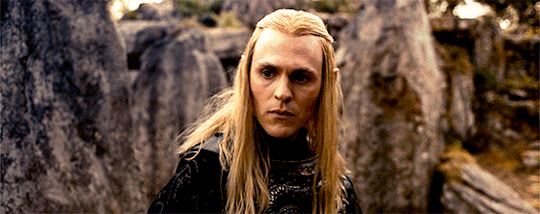
#saurondriel#haladriel#charlie vickers#morfydd clark#sauron x galadriel#halbrand x galadriel#my edit#trop analysis#haladriel meta#saurondriel meta
129 notes
·
View notes
Text
Yeah so I just finished the arc and what the hellllll. I’m gonna be thinking abt this one
WHAT THE ACTYSL FUCK!!!!!!!!!!!!!!!!!!!!!
#(chimera ant arc spoilers in tags)#startinggggggggggggggggggggggggggg#now#ok so.#as I said in the tags of the original post. the gon and pitou fight. what.#also. ‘we’re just as bad as the ants. no. we’re much much worse’ WHAT THE FUCKKKKKK. RADIATION POISONING???#like I’d seen a little of the arc before but probably no more than like 10-15 episodes#so going into this my main impression of these ants was scary!! dangerous!! eating humans!!#but then seeing them slowly learn and like. care for each other. get to the point where they could respect humans despite having more power#seeing the depth of the guards’ care for the king and how they were willing to do anything and everything for him.#seeing that some of them still had human memories and started remembering their past lives as time went by#and meruem’s transition from a being who only cared about himself to one who cared about komugi.#his questioning why he was born and what his name was.#and how in the end all he wanted was to play gungi with komugi in his last moments.#the way she was so happy to find someone who would value her for her#the queen desperately confirming her son was ok in her dying moments and having her last request be to tell him his name#like I knew on some level the ants were just doing what they needed to to survive#but bc some of them enjoyed killing humans it was hard to hold on to emotionally#but then it points out human corruption and greed and how humans are really doing the same things#the fucking bomb being not only powerful enough to nearly kill meruem the first time but also full of radiation#so meruem and everyone around him were guaranteed to die whether it was quickly or somewhat more slowly and painfully#also. back to the pitou battle. the juxtaposition of gon the mc going completely off the rails and summoning all the power he’ll ever have#in order to revenge kill pitou and pitou nen-puppetting their own corpse even after death#in an attempt to run out gon’s power and keep meruem safe#while meruem after realizing he was dying instead of trying to take as many humans as he could out with him#he just calmly asked palm to tell him where komugi was so he could spend his last few hours playing gungi with her.#and then he told her about being contagious so that she could leave before it was too late if she so desired.#like what the fuck. something about how everyone is capable of great good and great evil. especially on behalf of people you care about.#and the recognition of value and the recognition of similarities despite differences between the humans and the ants.#like wtf actually. oops this is tag limit & I didn’t even say everything but crazy fucking arc I’m gonna be thinking about this one I think
9 notes
·
View notes
Text
So after a decade and a half of obsessing over the Honorverse, I got into the Vorkosigan books, and given their similarities (both space operas, first published just a few years apart, same publisher, both continuing to the present day), I can't help comparing them, particularly their politics.
And it's interesting bc I used to describe the Honorverse to friends as "a conservative man writing a progressive future". Female MC with complete gender and racial equality as the ideal, but queer people are hardly mentioned. Military service is the Highest Calling and battles are shown in minute detail. Diplomatic solutions almost never work out. Abortion is legal, sex work is legal, "unconventional" family arrangements are legal, etc. but so is duelling in multiple legal traditions. One woman gives a speech about how important women's work is but it never impacts the plot in any way. Democracy is usually a problem whereas the use of strong monarch powers is a good thing. Lots of soapboxing about the evils of socialism/ communism, people 2000 years in the future inexplicably love the American Founding Fathers. The female MC has a kid and it's a minor b-plot that doesn't impact her career in any way and no one even suggests it should.
Meanwhile, I kinda feel like the Vorkosigan books are the inverse? A liberal woman writing a conservative universe. Like, we have disabled, queer, trans, and otherly-gendered people existing on a sexist planet. There are still ethnic divides. The male MC tells a friend he can't do anything to help her with sexism bc he depends on it. One hero is an entrepreneur but capitalism corrupts the voting system and the justice system in multiple books and the Planet of No Laws and Regulations is hell. Women's power is overlooked but it shapes the entire empire. The battle scenes are barely shown and war crimes and PTSD are ever-present no matter which side you're on. Diplomacy saves the day on multiple occasions. Punitive vs restorative justice. Duelling is illegal and leads to disasters. And the overarching theme of the entire series is family and social continuity, traditionally a big preoccupation of conservatives: how do we continue the family, how do we continue our society, how do we balance tradition and the need for change as we move into the future? The whole thing to date starts and ends with the deutero-Main Character, a woman, giving up a career to have kids.
And of course both series began in the late 80s/ early 90s with all the baggage that entails and slowly evolved as their authors' thinking did. Just an absolutely fascinating juxtaposition. I am sticking them in a blender and making myself a smoothie.
125 notes
·
View notes
Text
5.6. PARALOGISM SPOILERS
extremely polarizing feelings on this quest, ngl. i don't really have a problem with WHAT happened, but with HOW its happened.
first of all, pacing is crazy. after standing in a circle for 4 hours in a natlan finale we start doing ten million massive things in one hour, with almost no space for them to breathe or explore properly. this quest had less detalization than my bullet point inazuma rewrite. in fact, it feels like the writers did exactly bullet points in like one day and nothing else. i understand they were probs rushed due to change of direction with nod krai, but this is too much.
and tbh i dont even think it would take a lot to make this quest truly good. polish up an invasion sequence a bit, make it closer to natlan war section, add at least one actual cutscene. like the french gordon ramsey story quest had too many cut scenes, with special animations at that, and it tbh didn't need them, but they cant spare a separate cut scene for whole ass mond attack? hoyo, stop acting so cheap, we all know you have the money!
and then the main conflict, with albedo and durin. first of all. albedo saying that he considers himself a real human, just another type of human, and then saying that him killing susbedo is not a murder, bc he was NOT A PERSON??? babygirl, whats the difference between you two then? like he literally didn't have to say that, he could argue self defense bc that motherfucker tried to kill him and his friends. why dehumanize him and yourself?
and then framing durin as like ontologically evil, when all of his prev existing lore AND simulanka say that he was well intended, but with abyss aura that harmed the world just by existing. but now suddenly simulanka durin is the only one good, but actual durin is evil???? bc he's jealous of not being favorite child???? durin was thinking about how dvalin is beatiful and how he'd wanted to dance together while dvalin was killing him, but now hes pure evil bc of mommy issues, are you kidding me? bro did the writers of this quest even play simulanka? or take 5 minutes to read durin wiki page?? but even with that, in this very quest, venti says that durin feels like "an angry child". so you have an abandoned, tragic angry child lashing out and just go yeah, lets put him down, no attempts at reaching out??? what is this, hsr????
and like i truly think itd take like additional half an hour to fix and just a bit of actual writers effort. killing susbedo off screen is such a waste, and i'm not one of his fans or anything, i do not care about him personally, but he was a very well foil setup for albedo. and we exchange him for what? for fake copy of NPC no one cares about or knew before? literally why??? just washing 3 years of setup down the toilet.
instead of killing him off screen and having some durin mind controlled monsters (?????) dig him up for durin to eat, they could have just said he contacted durin himself. we know its possible! elynas is able to contact melusines through his blood crystals, same as dragonspine has, and even speak directly with the traveler when his heart awakens, and durin's heart is alive! bros, you already have the perfect setup, if only whoever wrote this took 10 minutes to read abyss dragons lore first! so susbedo could communicate with durin and teach him alchemy and influence his worldview!
albedo and susbedo could have had a confrontation that actually dramatizes albedo's conflict. albedo's answer to the truth of the world is that being a "real" human is about connecting with the world and other people, forging bonds and connections. which by itself is good character culmination and where it was always going, i always said that. but he just TELLS us that! instead, susbedo's philosophy could be the isolation, refusal to engage with the world, refusing to trust people bc he's afraid they will not accept him, and so instead using and controlling them. then it would be a juxtaposition of opposing viewpoints that SHOWS us albedo's arc instead of telling. and at the end of the trial susbedo could reveal the truth about albedo to try and turn ppl against him, but we could have mond people to accept albedo instead, bc they know him for years and he's friends with many of them! like that would be an actual logical conclusion of his arc, bc albebe, how are you gonna be like i'm a real human, truth is about having a life with other ppl, but you don't trust these ppl to not turn against you when they find out who you are?
and with durin i'm not even against durins merge, but they just introduced mini durin so rapidly, like RIP ppl who didn't play simulanka, and it wasn't explained in their "recollections" at all. and instead of just killing durin and replacing him with "better" durin, they could have communicated with durin, since hes whole theme is misguidedly lashing out, explain to him the situation. durin let himself be killed the first time bc he realized hes harming the world by existing, and he didn't want to, so they could have been like hey so in simulanka in special conditions we were able to clear abyss corruption from a version of you. we don't have fairy powers of life irl so we can't do the same exactly, but we can merge you with already cleansed mini durin, and we think this gives you the best chance to live an actual life as a part of this world, do you agree? like it wouldn't take much to write him to believably agree to something like that. like it would truly not even take that long to have that dialogue instead of putting him down like a sick dog.
76 notes
·
View notes
Text
Code Lyoko Lets Go
Because a couple of ya'll (specifically @magicalpoptarts and @imjustheretofangirl003) invited me to infodump about Code Lyoko! So I will! There will be a readmore eventually cuz no way this is gonna be short.
Disclaimers first: I have not watched Code Lyoko in (ooof) probably a decade or so. This is what I remember which mostly means the parts of the show I enjoyed the most! That said you are welcome to fact check me by going to Youtube and watching the entirety of the show for FREE because it's all on youtube on Code Lyoko English Official. Hell yeah.
Code Lyoko is a French animated TV series from 2003 that ended in 2007. Code Lyoko, at a glance, is a Monster of the Week type show where four students at a boarding school combat an evil computer program by diving into a digital world. Very notably this show chose (in 2003!) the badass style choice to have the real world be 2D animation, and the digital world be 3D animation

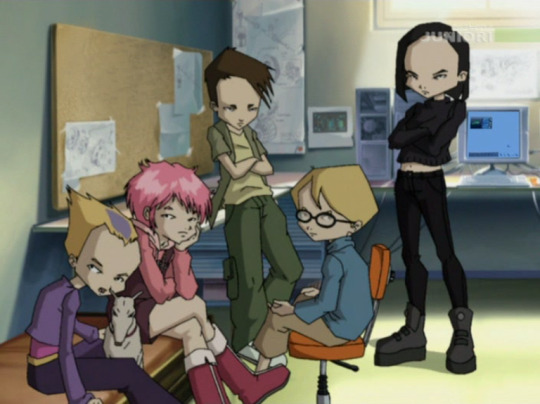
Everyone has giant foreheads and I love it. Clearly the 3D animation is old, but I absolutely love the choice to have these two style going at once as a way to differentiate the two areas.
Our cast:


Odd Della Robbia - My fave. Usually relegated to Comedy Relief but also can be thought of as The Heart. His lyoko form is a kitty, what isn't there to love.
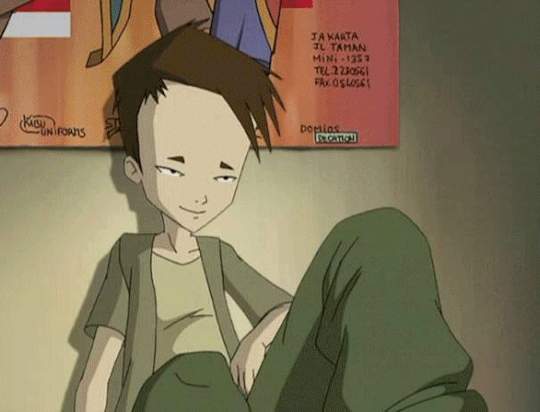
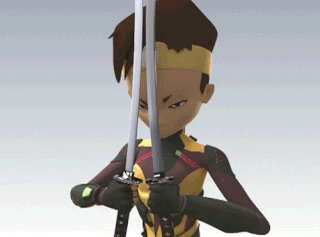
Ulrich Stern - More reserved and serious, he's the straight man to Odds' hijinks as well as roommates with Odd which creates *drama* between the two. He's athletic and has a lot of parental pressure.


Yumi Ishiyama - Also reserved, she's kind of a badass with both brawn (athletic) and brains (she can man the super computer which I'll talk about more later) She also has a lot of familial pressures - I think her and Ulrich are really meant to contrast and pair together (and indeed they are each others romantic interests). Her Lyoko outfit (ver 1) is one of my faves!

Jeremy Belpois - The computer genius nerd! The guy in the chair! He never receives a Lyoko Form (technically he went in there once but we never get to see what he looked like). He's a goal-oriented (workaholic) kind of guy and he's the one that first discovered the whole supercomputer.

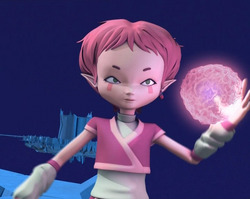
Aelita Schaeffer - Just born yesterday character type, a significantly softer girl in juxtaposition to Yumi. She was a sentient, amnesiac being that already existed in the supercomputer when it woke up, and for a long time it isn't clear if she is a person or a program, and working to get her into the real world is a big plot point.

Xana - The big bad. the evil computer program. Xana I don't believe ever has an actual appearance, just different monsters and forms that it controls and manifests through. Xana wants to... destroy humanity. I don't remember if there's ever a reason given why, but Xana does a great job at being evil!
And that's the main cast! Honorable side character mentions


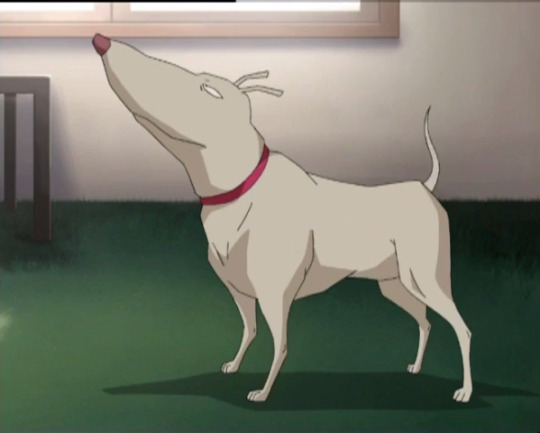
Jim is one of the teachers at the boarding school, a tough exterior and a heart of gold. He is usually the closest to discovering what the main cast is up to.
Sissy is the resident Mean Girl with a crush on Ulrich. She also ends up becoming closer to the cast and gets more depth over time.
Kiwi is Odd's dog that he hides in his dorm.

Edit: I forgot William but to be fair I don't really care about him lmao. He's a competing love interest for Yumi's affections. The group attempts to bring him into the fold and it does not go well. It's actually a good plot beat - for the group to try and bring in more help and for it to go poorly, which gives reasoning why they don't bring more people in in general. I just don't care for the love triangle.
The Plot:
One day, while looking for computer parts, Jeremy Belpois finds an abandoned factor and a giant computer inside of it.

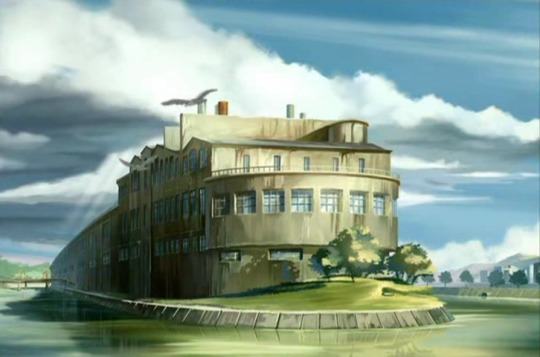
After turning it on through the controller room he learns about a sentient computer program that lives inside of the computer that has just been awakened, named Aelita. Aelita has no memories and simply woke up in the strange digital landscape of Lyoko - a strange place that appears like a forest with trees like pillars and endless pits between pathways. She is attacked by strange creatures, and takes shelter in a place called a tower.




Unknowingly to Jeremy, this also woke up the evil program known as Xana. Xana can take over towers (which makes them light up red) to create a connection to the outside world. Through that connection Xana wreaks havoc through a variety of means. this can mean basically creating monsters from stuff like creating a monster teddy bear, taking over peoples minds, controlling electronics, etc. Xana has a wide variety of abilities and the show never really states limits but like, in a good way that means that it doesn't usually get *too* stagnant.
Eventually (I really don't remember how) Odd and Ulrich and Yumi get involved with Jeremy, who figures out the the cause of the strange things happening in the real world are coming from the super computer he woke up. With Odd as their guinea pig (and eventually the others join) they use a strange room to digitize their bodies - a person steps in, Jeremy runs some programs from the Lab/Interfacing room, and they appear in the digital world of Lyoko, leaving the scanner they were in empty.

Their appearances and powers in Lyoko are determined on some subconscious level. When they appear in Lyoko they fight the monsters there and do their best to help Aelita get to the towers. Aelita basically has a key integrated into her that she can use on towers to shut them down. When she does this, the screen lights up with 'Code: Lyoko' (WOAH THATS THE NAME OF THE SHOW)


After Aelita does this, Jeremy runs a program he calls 'Return to the Past' which sends the entire world back in time to whenever Xana activated the tower. This undoes all the damage that Xana causes in the real world, and the only people who remember the world being reset are people who have been to Lyoko before (the main cast, naturally, although the first time he did it Jeremy had not been to Lyoko before so he also forgot the events that occurred). A Return to the Past does NOT bring people back to life, however, which maintains the stakes of any given situation as property damage can be undone, but if someone is killed that isn't something that can be fixed.
This is pretty much how the episodes progress - The Lyoko Warriors (the main cast) have something happening at school (a dance, a test, they're learning something in Science) and Xana begins to interfere with the real world, usually in a way that directly affects one of the Main Cast. The main cast then need to find a way to escape to the Supercomputer and get into Lyoko (since they aren't actually allowed to leave the school grounds - the cast getting stuck because of teachers or because of other commitments is a common dramatic beat). They go there, beat the monster, and get Aelita in the tower. In the overarching story they work on figuring out who Aelita is and if they can get her out of the computer, who made the computer in the first place, and how to defeat Xana for good while also navigating interpersonal conflicts and teenage drama.


They're teens so they get to the factory through the sewers using skateboards and scooters. It's great.
Misc Stuff:
There are four sectors in Lyoko, providing some variation in vibes, but they're all pretty bare bones. Eventually they discover another sector that's like the heart of Lyoko which is also pretty simplistic (it was early animation idk what to tell you). THEN they learn that if they travel through the digital ocean they can go to OTHER Lyokos (which disappointingly all are like copies or look the same the one we're familiar with).
Speaking of the digital ocean, all of the land areas and platforms of Lyoko are over what is called the digital ocean. The digital ocean is dangerous for our protagonists - if they call into it their code will be lost and they will, unable to be brought back to the real world. There are several tense scenes where the main characters have to kill the other or kill one another BEFORE they fall into the ocean.
When the Main characters die in Lyoko they appear in the Scanner room visibly shaking and gasping, leading to the common belief that the pain they experience in Lyoko translates to real world pain - including the feeling of death!


In order for people to go to Lyoko someone in the lab room has to activate the scanner programs. This is usually Jeremy, but is sometimes Yumi and I think eventually Aelita can as well? But I like the way that certain characters need to be able to get out of whatever sticky situation they're in to get the whole thing working - a minimum of two people needed is nice. Jeremy eventually also is able to code various vehicles for the crew to use in Lyoko.
Initially Odd had a future sight ability but it gets taken away partway through season 1 and I will ALWAYS be bitter about that.
The show reuses A LOT of animation because of the tight budget. My last rewatch it started to bug me, but I probably wouldn't mind as much now. (the scanner animation they reuse is actually my fave I love it every time) It also has some real pacing issues where several episodes in a row can feel really repetitive as the characters bang their heads against a problem and it feels like it ends the same way every time.

Ultimately what I love about Lyoko is the characters and the concepts. It's a show I think is RIPE for a good remake and re-imagining. The using the two versions of animation was really clever, the teenage monster of the week was exactly the kind of thing I loved to fantasize about when I was a kid, wishing that was my life haha. The designs are fun, the stakes are good but not TOO serious, and a lot of the story and characters I think could be expanded on or changed, such as giving Xana more of a background and adding more variety to the Lyoko world itself. (and maybe fix some plot beats I am unsatisfied with?????)
There were some seasons after 2007 in like uhh 2013 or 2015 or something??? Called Code Lyoko evolution, but the 2D portions of the show were now live action. I uh, never watched it.
If you have any questions or want to chat more about Lyoko let me know!!!! I love this show!!!! I loved watching it without any context for what was going on as a kid and I miss it!!!!!
I also really like the Gargage Kids Pilot (The Code Lyoko short pilot). It has a lot in common with the end product but also a lot different! Ulrichs Lyoko design is a completely different model and Lyoko has more dimensionality to it, some of their powers look like they cross over to the real world, and the vibes of the supercomputer factory is way different. (warning though the CGI models are UHHH rough looking. This must have been like 2002? BE NICE OKAY)
121 notes
·
View notes
Text
Might be wrong about this, but the snake statue in The Next Prince episode 4 looks to be based off of a real Naga religious statue at the Monkuware Thao Wessuwan Temple in Chiang Mai, which I only know because Pompam Niti (GMMTV actor) posted a pic of going to worship at it earlier today. And even if it’s not specifically based on this statue, it’s still interesting and relevant to The Next Prince to know the tradition around the serpentine Naga figures in the region.

Here’s the only Anglo resource on it I found after a bit of digging. If nothing else, you can enjoy the incredible butch Australian social worker giving the video tour.
youtube
It’s interesting to see how The Next Prince, with it’s explicit commentaries on colonialism and European culture so far, seems to be playing with the negative cultural associations with snakes born from Abrahamic religious traditions that much of the international audience grew up with. Snakes are manipulative, evil, satanic since the garden of Eden. Are we meant to apply those values to the Phuchongphisut family in the same way we’re meant to make those connections to Slytherin in HP?
Meanwhile, Thailand’s traditions around the serpents, along with much of South and Southeast Asia, is linked to the Naga figure that we see above. I’m just grabbing this info from Wikipedia so I’m glad to hear more insight from people with more familiarly. According to the wiki article, Naga’s are divine beings that can take the form of snakes, humans, or half-snake/half-humans. As in much of religion outside of the Abrahamic traditions, nagas aren’t essentially good or bad.
Some beliefs that might help in appreciating The Next Prince (we’ll see 🤷🏻♀️):
1. Their role as followers of one of The Four Heavenly Kings (4 kings sound familiar?), Virupaksa, who guards the Western direction
2. Like the Phuchongphisut family crest, the nagas are depicted with gems and jewelry, as they hail from the underworld (caverns included), where precious stones can be found.
3. Their also sometimes depicted holding Amrita, an elixir for immortality, which seems significant after the last conversation between Charan and the King, about the myth of the one mortal and one immortal Gemini twins, Castor and Pollux, in the constellation—another western myth contrasted with the South Asian beliefs of that same constellation, Mithuna, which in addition to the meaning of twins, also apparently refers to coupling up romantically and sexually, but specifically as a male and female pair, adding a-whole-nother layer of implications to the king shoving that painting in Charan’s face.
4. The story in the Lotus Sutra of Longyu, or the dragon girl, who upon listening to the Lotus Sutra be read aloud, transforms into a male Bodhisattva. It’s a story that’s been argued to either prove or disprove one had to be male to reach Buddhahood. The gender politics sound like they could mesh well with TNP.
The Next Prince’s juxtaposition of European cultural legacies against the South Asian cultural beliefs creates such a rich narrative tension for me. I’m looking forward to all the meta it’s gonna inspire and hope others pick up on everything it’s doing. So glad Domundi seems to have spent their hefty investment on the writing as well as the rest of the production!
#the next prince#the next prince the series#the next prince meta#zeenunew#charankhanin#thai bl#domundi
42 notes
·
View notes
Text
Middle of the night GO thoughts after reflecting on a couple of comments that the 'you're being silly' scene is actually not just the adorable soft exchange I have been caught up in. I mean it is, but it also isn't.
And it got me thinking that the whole of season 2 is like this, almost the entire time we have two truths in play. The whole season is one of duality.
A few examples (there are many more woven throughout but just to illustrate the point):
Right off the bat, the opening scene, it's both ominous and hopeful. Aziraphale is restrained while angel Crowley full of abandon; one angel is aware of the danger of questioning, the other is naïve. Both are experiencing the same moment in rather different ways. It sets the tone of the season immediately and puts in motion this layered truth within the story.
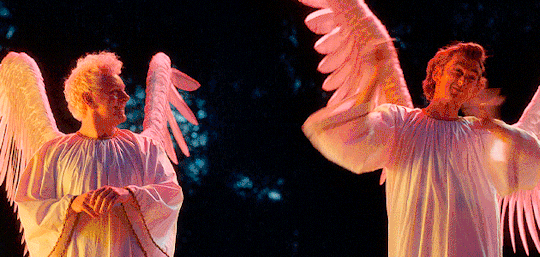
The minisode with wee Morag and Elspeth, the entire graverobbing premise presents us with the dual truth that digging up the dead is bad but the selling of the bodies to the surgeon, thus contributing to saving lives, is good.
Aziraphale grapples with the duality here, justifying the actions of Elspeth by convincing himself that one truth is greater than the other. We also see that Crowley is far more able to recognise the complexity of multiple truths being valid depending on circumstance. This whole minisode feels like Neil showing his hand a little bit, the duality is so explicitly addressed, meanwhile we, the audience, are engaged in a larger unfolding story in which we are observing similar layered truths playing out in different ways.
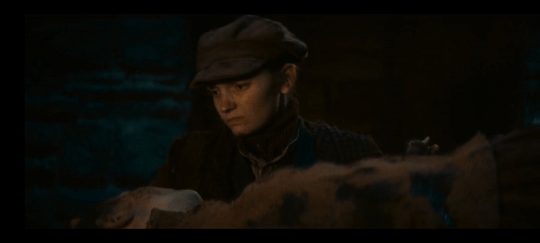
Now the scene that made this whole thought process unravel, still one of my favourite scenes and will remain so, is the "smitten, I believe...you're being silly" exchange. It is both tender and awful.
Here we have Crowley, expressing his very real fear of JimGabriel, opening up to Aziraphale that he doesn't feel safe in the bookshop because of the constant fear he will wake up, and Aziraphale just looks at him with heart eyes and tells him he's being silly. This flags so loudly that we're watching two characters who are experiencing very different versions of their current reality, due to past experience, yes, but also, Aziraphale and Crowley each have their own idea about the right way to react to the current situation.
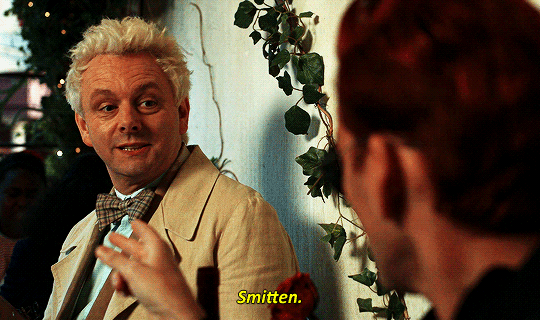
It's been pointed out by many before me, but the ball is another example of incredible juxtaposition and an extraordinary display of two truths existing at once. It is both incredibly romantic and an actual nightmare.
It is reflected, once again, in the way Aziraphale and Crowley are experiencing it, we know one character is caught up in the romance, the other in the horror show, but as a viewer, we are being tasked with holding both truths in our mind simultaneously. And both are true.
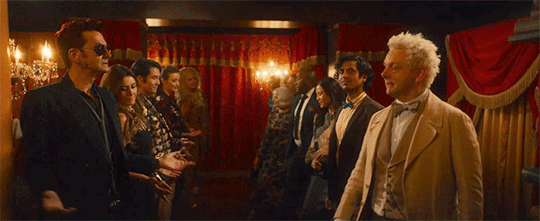
Aziraphale the entire season is both giddy in love and completely dismissive of Crowley. It is adorable and infuriating at the same time.
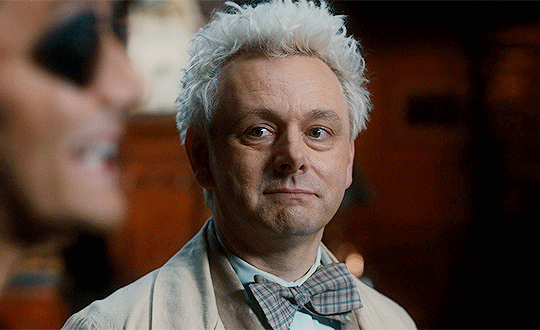
And yes, it is a reflection of the very duality the entire premise of Good Omens presents us with - that something can be good and bad at the same time, pure and corrupt, that the entire binary of Heaven and Hell/good and evil is flawed because those concepts can and do co-exist.
But the way it is seen in the interactions on a personal level this season is what has leapt out at me. It's why I think we see people falling into different interpretations of a lot of the scenes and moments, because they are more than that, they are observations. We are often observing two sides of the same coin, and both are true. The sheer genius of it and the way it is a mirror to the characters and the entire concept of the show we are observing is, quite frankly, mind boggling.
And it all comes to a head in the final fifteen™. There is so much duality in play here that it is no wonder there are hundreds of posts untangling bits of it and trying to extract the meaning from within the many layers. It's because we are given two truths in this final scene that are both heartbreaking.
Crowley loves Aziraphale and wants them to be together, free at last. Aziraphale loves Crowley and wants them to be together, free at last.
BUT
Aziraphale wants to use the system to keep them both safe. Crowley wants to escape the system to keep them both safe.
And then all the moments of duality between them throughout the season reach a critical juncture: Aziraphale in love but dismissive, Crowley understanding that Heaven = good is too simplistic and trying to compel Aziraphale to remember the lesson from Edinburgh ("when Heaven ends life here on Earth, it'll be just as dead as if Hell ended it"), Crowley trying to use the notion of romance to counter the nightmare with a desperate kiss.
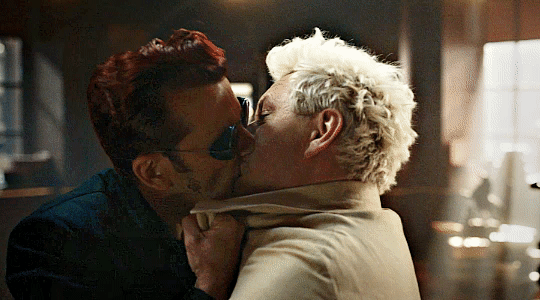
It's a complete inversion of those two truths in the opening scene of the season, the entire scene is at the same time ominous and hopeful, but it is Aziraphale who largely being naïve and Crowley who is aware of the danger.
I mean, it was all spelled out for us really, this duality and the fact that those multiple truths in play were always going to come to a head. It was all there, wrapped up in this quote:
"What does your exactly mean, exactly? I feel like your exactly and my exactly are different exactlies".
#good omens#good omens meta#aziraphale#crowley#aziracrow#honestly don't know if this even makes sense#middle of the night thoughts and all that#good omens thoughts
983 notes
·
View notes
Text
I know this theory has already been thought but I wanna delve deeper into it. I think the man who appears at the end of s2 ep1 is Abel. I know there have been theories about him being a demon hunter, but some of the reasons I'm not that sure he is one are tied to the circumstances of his appearance and the context provided by the narrative.
[long rant ahead hehehe]


Both look unusually pale and have a similar face structure, and the contrast of white hair vs. black hair makes me believe he might be the abel to his cain lmao. The contrast suggests an obvious juxtaposition, as if they were meant to be two sides of the same coin.
We know Cain hasn’t visited Heaven in a long time, and his strained relationships with the other immortals hint at a larger, unresolved conflict (they basically gossip about him going against his own family). AND let's not forget the deeper context here. In the biblical narrative, they're the first children of Adam and Eve. Then, Cain kills Abel out of jealousy after God favors Abel's offering over his own. But what if in HSR Abel never truly died? What if he survived and is now on a mission to confront his brother, perhaps to stop him from causing further destruction or to seek vengeance for what he did to him?

If Abel somehow endured, it would make sense for him to appear now, especially after we’ve just learned about Cain’s alternative, more destructive form. Besides, the fact that Pileon, a demon, is the one who finds him is rather telling. If this character were a demon hunter, it seems unlikely that a demon would be the one to discover him in such a vulnerable state—bloodied, weakened, and seemingly at the end of a fierce battle. The timing of this man’s arrival—just as we uncover Cain's darker nature—is too precise to be coincidental.


As a philologist, plotwise, him being Abel would certainly make sense in the context of the story's themes—of survival, moral conflict, and the struggles between heavenly and demonic forces in a world devastated by apocalyptic events. His return could add a layer of depth to the ongoing narrative, representing a force of justice or redemption against Cain's darker tendencies.
Moreover, if this mysterious character were simply a demon hunter, his appearance might lack the same emotional and thematic weight. However, as Abel, his presence would be deeply significant and would make great storytelling. He would embody not just a force of opposition against Cain, but a figure who brings moral complexity and personal stakes to the narrative. He could even represent vengeance, adding layers to the conflict between good and evil in a world ravaged by apocalyptic forces.
With all that being said, if he ends up being a demon hunter or something completely different, I'd really like to see a compelling reason for it. Something that works as a plot device that deepens it even more. Since Alexandra is doing an amazing job with HSR, I don't doubt her, she'll excel at it!!!
#romance club#rc#rc lane#rc hsr#rc cain#heaven's secret requiem#rc heaven's secret requiem#rc theories
122 notes
·
View notes